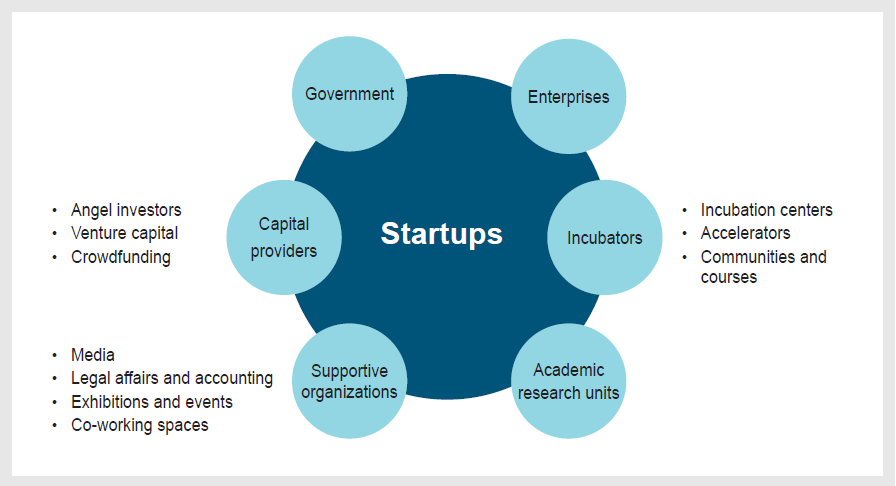Source: Taiwan Economic Forum
The startup community created the initial momentum for the development of Taiwan's startup ecosystem. During the early 2010s, key actors in the private and public sectors attempted to introduce new concepts and methods, such as entrepreneurship competitions, entrepreneurship education, and accelerators, based on common beliefs, and it seemed to start a cultural movement that led to the development of the startup community.
The book looks closely at matchmaking resources, such as incubators and accelerators, in which "intermediaries" are important contributors that collaborate with the government and enterprises to assist startups as they grow. According to data from the Taiwan Institute of Economic Research, there are currently over 60 accelerators in Taiwan, and the number peaked in 2018 due to the trend of corporate. startup engagement. In another aspect, the large number of incubators that operate as non-profit organizations utilize their wide range of connections and mentor resources to accelerate the growth of startups. Furthermore, the involvement of exhibitions and events, associations, and legal affairs and accounting units gradually developed a diverse and close startup community with intensive exchanges in Taiwan.
The government's transition and inputs also made important contributions to the development of Taiwan's startup ecosystem. "Innovation and entrepreneurship development" was included as a comprehensive cross-departmental policy around 2014, with "HeadStart Taiwan" as an important watershed. Taiwan's government subsequently launched the major cross-departmental industry policies "Asia Silicon Valley Development Plan" (2016), "Action Plan for Enhancing Taiwan's Startup Ecosystem" (2018), and "Asia Silicon Valley Development Plan 2.0" (2021), in which innovation and development were at the core of the policies. The policy systems for startup incubation and technology policy that had been in place for years were also integrated and transformed. The regulatory environment for startups started in 2017, and relatively intensive amendment results began to appear in industry-academia connections, talent recruitment, and fundraising for startups.
Another important change was the government's gradual transition to the role of matchmaker and guidance provider, whether it may be to guide market capital to invest in startups or promote entrepreneurship clusters. The government also collaborated with private actors and formed new public-private partnerships. Taking the National Development Fund (NDF) as an example, the "Angel Investor Project" (2012) directly invested in startups, and the "Angel Investor Program" (2018) matched venture capitalists and angel investors to jointly invest in startups. As for entrepreneurship clusters, there are nearly a hundred startup bases or parks supported by the government, including Taiwan Startup Stadium, Taiwan Innovation and Entrepreneurship Center, Startup Terrace Linkou, and Startup Terrace Kaohsiung, which receive assistance of resource matchmaking from the government, allowing them to become a key gateway to the world. For the complete content please find attached article.
